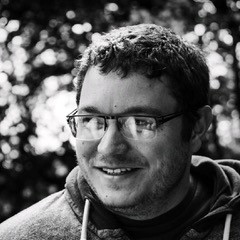Deryn Tries to Write a Poem
She tells me that she wants to write a poem,
longs to scrawl out something Plathic, something Oliverian,
but the pencil scratches at the paper like a blackbird
looking for worms in a drought. I want to tell her that this will do,
but she is fictional, living only in my mind, and so
there is little I can do to convince her that her words,
or mine, are worthwhile. From a bench on the cliff path,
notepad on her knee, she watches a trawler on the horizon,
feels within her chest the weight of every fish
being lifted from the ocean. I want to reach out
and hold her, to place her head against my chest,
but she is even less than vapour. I want to tell her
that I am sorry for placing a trawler on the horizon,
sorry for placing her in view of it.
She tells me she once visited an art exhibition in Cardiff,
a room of thirteen paintings along one long wall,
each one a different shade of black,
each black and yet unique.
She felt like one of those canvases,
close enough to blend into the crowd and yet somehow perverse.
He never saw her that way, never saw the darkness.
He also is not real, and I have to assume that I am telling her this,
but I am no longer sure which parts of her are her
and which are me, and which parts of me are him.
To him she was the thrift that purpled the cliff tops,
knapweed, sea campion, but his eyes are now closed and buried.
To me she is a vehicle for something, but I am not quite sure what.
I tell her that I am sorry for this also, that in another world, or
in the imagination of another poet, her father would be sat with her
on the cliff top, and there wouldn’t be a trawler,
and she wouldn’t be half crow and a shade of black that blends into the crowd.
She watches the clouds cast their shadows on the distant headland,
senses the surface of the water grow darker like my hold on her non-reality.
She tells me that she wishes to be kingfisher blue,
to hang in a gallery of black squares on white walls
and have the whole world look at her because she is not
the pale faced girl with the straight black hair, because she is not
just one more sole caught in the net.
• • •
 John Newson has had work published internationally, from haiku to prose poetry, in free verse and metrical, formal and informal. His poems have appeared in multiple journals including The Lyric, The Moth, The Inflectionist Review, Modern Haiku, and DMQ Review. John often edges towards the pastoral, leaning into the subjects of nature and faith.
John Newson has had work published internationally, from haiku to prose poetry, in free verse and metrical, formal and informal. His poems have appeared in multiple journals including The Lyric, The Moth, The Inflectionist Review, Modern Haiku, and DMQ Review. John often edges towards the pastoral, leaning into the subjects of nature and faith.